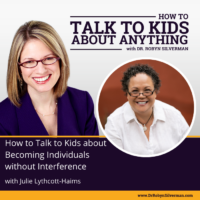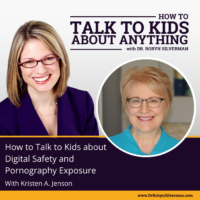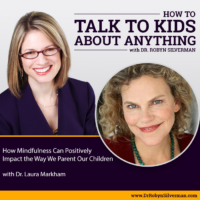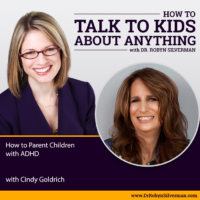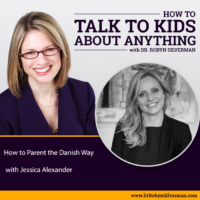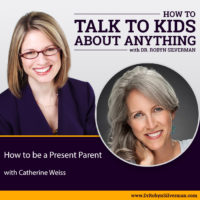Podcast: Play in new window | Download
Subscribe: Apple Podcasts | RSS | More
How to Parent without Perfection
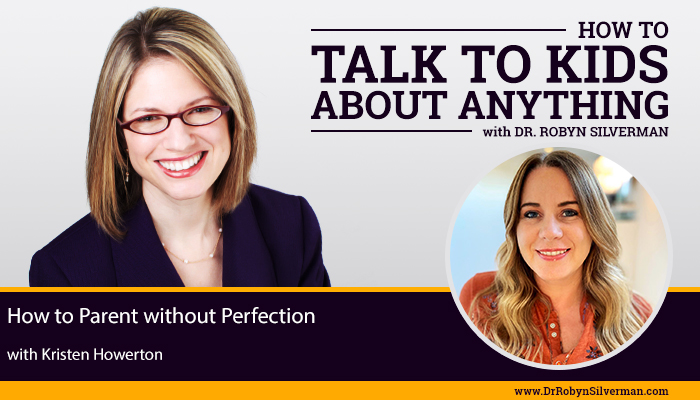
This podcast is about how to parent without perfection. While we may have pictured smiling, complaint-free kids frolicking in meadows, taking out the trash without prompting, and feeling carefree ease as we baked cookies in a clean and organized home before we had kids-this is not reality. Kids are not perfect and neither are we. Far from it. The quicker we accept that life is messy, with spills, frustration, disorganization, and yes, some quarreling too, the better. Families and life moments can be both beautiful and contentious at times. Dr. Robyn Silverman interviews Kristen Howerton on the How to Talk to Kids about Anything podcast.
Before we launch into the show notes of this most recent podcast episode, let me first say thank you again for the 5-star reviews on iTunes!I’m so glad you loved the most recent podcast with Carrie Goldman on bullying and took the time to write in. PHX78 says “This info came at the right time. So glad to have some help and direction in dealing with this topic.” And Jahazag said “Fabulous! Such a tremendous resource! She asks her knowledgeable and insightful questions all the questions I would want to ask. Many thanks!” So grateful you took the time to tell me how you’ve been receiving the podcast and for those 5-star reviews!IntroLet’s get honest. Have you ever said to yourself: “I’ve got it all figured out…before you had kids?“I will never do that. . .” and now that you have kids, well, you do?“I need a time out…a nap…a break?”I may look like I’ve got it all together but inside I’m a hot mess?”Actually, I’m a hot mess on the outside too…what IS that on my shirt?”“Am I good enough? Doing enough? Doing it right? What’s wrong with me? What’s wrong with these children? Are they eighteen yet?”Well, you’ve come to the right place. Today, there is no reason to get your zip-up pants on or even a clean shirt. You don’t have to brush your hair or even pretend that everything is just FINE, thank you very much. YOU are among friends who get it. Deeply. Today, we are talking about parenting without perfection and a whole bunch of other really important issues that are often left unsaid. There will be an open confession that, as it says in my next guest’s book; “ The happy family life is supposed to be messy. A lifestyle of only perfect moments is not a lifestyle I’m familiar with nor is it one in which kids can really thrive.” Who are we doing this episode with? Well, she doesn’t know it yet, but as I was reading her book, I thought; “I could be best friends with this person. Let’s see if we can make that happen.” And this new bestie’s name is Kristen Howerton.
KRISTENHOWERTON is a licensed marriage and family therapist and the mother of four children within four years via birth and adoption. She is the founder of the blog Rage Against the Minivan where, in the midst of writing about the raw emotions and experience of motherhood, she has become a fierce advocate for social justice. Kristen has created several popular humor destinations online, including the popular “Pinterest You Are Drunk” and the#assholeparent meme and Instagram account.Kristen is the co-host of Selfie, a podcast dedicated to exploring the mind, body, and spirit aspects of self-care.
Important Message:
- “I had it all planned out. There were meadows involved. There would be handmade wooden toys and organic home-cooked meals. There would be picnics on hippie-inspired blankets (in the meadows_ and vintage books and lazy days at the park (more meadows.) I knew the kind of mom I’d be. Breezy. I also knew what kind of mom I wouldn’t be”—explaining that you has a friend who had poop on her shirt and didn’t seem care. Then—something happened- what?–> I learned that children are children even in meadows!
- Parents have expectations- but kids don’t often share them!
- Adoption- took a few years. “It took a few years. I am a parent and I had to love anyway. Like we all do.”
- You want it to feel like a storybook- and it’s often not.
- We have all had that moment of frustration when we can ask ourselves; what would I do if I felt loving even though we don’t feel loving in that moment. Sometimes love is just a verb and we have to roll our sleeves up and go through the motions of being loving.
- Infertility- often not talked about- don’t often realize the physical and emotional consequences. It’s a misunderstood loss- dismissed. We need to get talking about this.
- Adoption- can have unforeseen complications. Even a child who is on the fast-track for adoption, something can come up that causes delays. For example- a family member who emerges who wants to adopt the child. You are stuck in an unknown state- is this my child? “I must parent as if this is my baby.” That’s what a baby deserves.
- Watch what you say to an adoptive parent matters. “Of course you got pregnant after adopting! Now you have your own child!” A biological child is not “better” and a biological child is not “the prize” for adopting.
- A mom who had a hard journey to children- you have just as much a right to complain and whine than any other parent in the community of moms you live in. We are not exempt from these feelings.
- Give yourself permission to speak about feeling frustrated. We are not bad people for getting irritable. It’s not the partridge family. People need time alone too.
- Let yourself off the hook.
- Racism: Messaging- “don’t talk about race. Don’t see color. Everyone is human. Don’t notice race.” This sends a subtle message, especially to white children that race is problematic. If we can’t talk about it- must be something bad. It’s not an insult if your child notices that my child is brown. My children are proud to be black. We have a lot of work to do as white people to become comfortable with talking about race.” Being color-blind is not working for us. We need to listen so we can create empathy.
- How do we incorporate diversity? From a young age, make sure diversity is reflected in your home. Do an audit of your books, your dolls, the shows your kids watch. Make sure all of them reflect people of color- black people, Asian people, Latin people. You are really representing the wide array of people in the world. Make sure you are putting yourself in diverse settings. If you are routinely in all white-settings, ask yourself some hard questions. Do we need to look at a different school system? Different church?
- Racism does not need to be taught. If you think about the kid who gets made fun of on the playground who has glasses, this is not because a parent said; “we are not friends with people who wear glasses.” Kids can be terrible. They are getting subtle messages from us, from our community.
- If your child does something racist- have a conversation. Acknowledge that your child may behave in ways that don’t show the anti—racist perspective you espouse.
- #Assholeparents- we have to laugh. A yellow straw in a pink cup. A broken granola bar.
- You have to make a social goal- like make friends- just like you make any other goal. Put yourself out there.
- Sometimes we judge other moms- because of jealousy. Be conscious of your choices.
Notable Quotables:
- “I wanted to be really honest about motherhood. I love being a mom and there are moments that I find dazzlingly beautiful but there are other moments that I find incredibly difficult.”
- “Children are their own people with their own will and they don’t always comply with the picturesque scenes that we’ve planned for them.”
- “What would a loving mother do?”
- “Miscarriage is a misunderstood loss.”
- Foster to adopt: “I must parent as if this is my child because that is what this baby deserves.”
- “My biological daughter wasn’t my prize for adopting my son.”
- “Two things can be true at once. We can be insanely grateful for our children and for the journey that brought them to us and we can also be really tired and speak about that.”
- “It doesn’t make us a bad parent if we want a break from our kids, it just means we need to refuel. We don’t have to feel guilty about taking breaks.”
- “Sometimes kids from non-racist homes can have moment of being terrible.”
- When we say things like; “don’t talk about race. Don’t see color. Everyone is human. Don’t notice race.” This sends a subtle message, especially to white children, that race is problematic. If we can’t talk about it- there must be something bad. It’s not an insult if your child notices that my child is brown. My children are proud to be black. We have a lot of work to do as white people to become comfortable with talking about race. This color-blind notion is not working for us.”
- “We need to acknowledge race. We need to talk about race. We need to listen to the experiences of people who are different. As white people, we need to listen to the experience of people of color. We need to hear about how their experience is different from ours so that we can empathize. That’s really the goal.”
- “White parents have to stop being so defensive. Their child can do something racist and not BE a racist.”
- “You have to figure out what you are opting into and what you are opting out of as a mom. You can’t do it all. What are the things we are giving up in order to have the things that we want? We have to opt out of some of the expectations of motherhood.”
Resources:
Book: Rage Against the Minivan
KristenHowerton.com
@KristenHowerton
@RageAgainsttheMinivan (#asshole parent)
The post How to Parent without Perfection with Kristen Howerton – ReRelease appeared first on drrobynsilverman.com.

